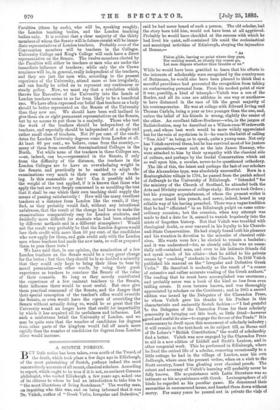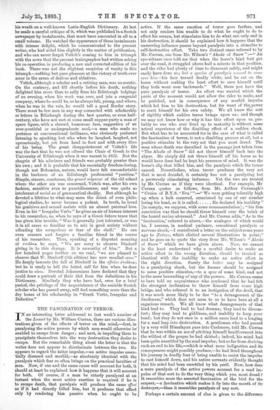A SCOTCH PORSON.
BUT little notice has been taken, even north of the Tweed, of the death, which took place a few days ago in Edinburgh, of the most painstaking of Scotch, perhaps indeed the most remorselessly accurate of all recent, classical scholars. According to report, which ought to be true if it is not, an eminent German philologist, who visited Edinburgh a few years ago, asked one of its citizens to whom he had an introdietion to take him to "the most illustrious of living Scotehmen." The worthy man, on inquiring who this was, and on being informed that it was Dr. Veitch, author of "Greek Verbs, Irregular and Defective,"
said he had never heard of such a person. The old scholar, had the story been told him, would not have been at all aggrieved.
Probably he would have chuckled at the success with which he had lived his quiet, self-contained life amid the ecclesiastical and municipal activities of Edinburgh, obeying the injunction of Donne,— " As
Fishes glide, leaving no print where they pass,
Nor making sound, so closely thy coarse go,
Let men dispute whether thou breathe or no."
While he would have been gratified to learn that his efforts in the interests of scholarship were recognised by the countrymen of Buttmann, he would also have been pleased to think that a merciful providence had prevented the recognition from taking an embarrassing personal form. From his modest point of view it was, possibly, a kind of triumph—Veitch was a son of the Border, and all its sons are athletes in one way or another•••• to have distanced in the race of life the great majority of his contemporaries. He was at college with Edward Irving and Thomas Carlyle, being a year or two younger than the one, and, unless the belief of his friends is wrong, slightly the senior of the other. An excellent fellow-Borderer—who, in the jargon of Redistribution, may be described as a Wilson-cum-Wordsworth poet, and whose best work would be more widely appreciated but for the vein of mysticism in it—he was in the habit of calling "Tom Aird " as being, so to speak, quite a young man. Not only has Veitch survived these, but he has survived most of his juniors by a generation,—men such as the late James Hannay, who were attached to him by their sympathy with the classical side of culture, and perhaps by the feudal Conservatism which sat so well upon him, a secular, never-to-be-questioned orthodoxy.
The life of this, the latest and perhaps the last of our scholars of the Alexandrine type, was absolutely uneventful. Born in a Roxburghshire village in 1794, he passed from the parish school of Jedburgh to the University of Edinburgh. " Intended " for the ministry of the Church of Scotland, he attended both the Arts and Divinity courses of college study. He even took Orders ; but his younger acquaintances, of whom the present writer is one, never heard him preach, and never, indeed, heard in any reliable way of his having preached. There was a vague tradition that he had" officiated" in an Edinburgh pulpit on some extra- ordinary occasion; but the occasion, when any attempt was made to find a data for it, seemed to vanish hopelessly into the mists of forgotten history. Not that Veitch was troubled with theological doubt, or ever wavered in his loyalty to his Church- and-State Conservatism. He had simply found both his pleasure and his vocation in devotion to the minutiaa of classical criti- cism. His wants were few ; he elected to remain a bachelor; and it was understood—for, as already said, he was an essen- tially self-contained man, and even to .his intimate friends did not speak much of his affairs—that he added to his private means by " coaching " students in the Classics. In 1848 Veitch published his manual on the "Irregular and Defective Greek Verbs." He described it modestly as the result of "a course of extensive and rather accurate reading of the Greek authors."
The reading that he must have accomplished was enormous ; and probably never was a book of the kind so free from even
trifling errors. It soon became known, and was thoroughly appreciated by scholars on the Continent ; and in 1865 a second edition was issued by the Delegates of the Clarendon Press, to whom Veitch gave his thanks in his Preface in this characteristic and eminently Scotch fashion :—" I feel grateful to the Delegates of the Clarendon Press for their scholarly generosity in bringing out this book, so little fitted—however cod and useful its aim—to engage the favour of the Trade." his unnecessary to dwell upon this monument of scholarly industry ; it will remain as the text-book on its subject till, as Burns said of De Lolme's "British Constitution," the world of scholarship find a better. Veitch was now engaged by the Clarendon Press to aid in a new edition of Liddell and Scott's Lexicon, and in other congenial work. This he performed in Edinburgh, where he lived the retired life of a scholar, removing occasionally to a little cottage he had in the village of Lanton, near his own Jedburgh, where once the present writer, when on a visit to the Scott country, found him gloating over classical proofs. The extent and accuracy of Veitch's learning will probably never be fully known. His acquaintance with Latin literature was as intimate as his acquaintance with Greek. Lexicographers of all kinds he regarded as his peculiar game. He denounced their enormities in unmeasured terms, and hunted them down without mercy. For many years he poured out in' private the vials of
his wrath on a well-known Latin-English Dictionary. At last he made a careful critique of it; which was published in a Scotch newspaper by instalments, that must have amounted in all to a small volume. He watched the appearance of these instalments with intense delight, which he communicated to the present writer, who had aided him slightly in the matter of publication, and who can never forget Veitch's coming to him in triumph with the news that the peccant lexicographer had written asking his co-operation in producing a new and corrected edition of his book. There was not the slightest suspicion of vanity in this triumph—nothing but pure pleasure at the victory of truth over error in the arena of datives and ablatives.
Veitch, although a scholar and a retiring man, was no ascetic. On the contrary, and till shortly before his death, nothing delighted him more than to sally from his Edinburgh lodgings of an evening, when his work was over, and join a congenial company, where he could be, as he always felt, young, and where, when he was in the vein, he would tell a good Border story. There must be few men in any way connected with scholarship or letters in Edinburgh daring the last quarter, or even half- century, who have not met at some small supper-party a man of spare figure, with a shrewd, humorous face, suggestive of an ever-youthful or undergraduate soul,—a man who made no pretence at conversational brilliance, who obviously preferred listening to sPeaking, but who when he laughed, laughed, not uproariously, but yet from head to foot and with every fibre of his being. The great disappointment of Veitcb's life was the fact that he was not offered the Chair of Greek in the University of Edinburgh when it was vacant in 1852. But the chagrin of his admirers and friends was probably greater than his own ; and it is probable that his essentially freedom-loving, though not Bohemian, nature, would have felt uncomfortable in the buckram of an Edinburgh professorial "position." Simple, sincere, courteous, the grand seigneur of the old school where the other sex was concerned, Veitch was, after his own fashion, sensitive even to punctiliousness, and was quite as intolerant of social as of grammatical shoddy. But although he devoted a lifetime to what may seem the driest of even philo- logical studies, he never became a pedant. In truth, he loved his genitives and second aorists with an almost paternal love. Even in his "Irregular Verbs" he gives an air of human interest to his researches, as, when he says of a Greek future tense that has given him trouble, "Was it generally just tolerated, or was it in all cases so familiar as to mix in good society without offending the scrupulous or fear of the shell." He can even censure and forgive a familiar friend in the course of his researches. Thus, speaking of a disputed meaning of t;ronocc he says, "We are sorry to observe Dindorff giving in to this change. It is unworthy of him." But a few hundred pages further on we read, "we are pleased to observe that W. Dindorff (5th edition) has now recalled ukaer." He deeply laments the fall of Dindorff in the affairs in:A.6ga ; but he is ready to kill the fatted calf for him when he does justice to gid-qtr. Devoted Johnsonians have declared that they could draw a portrait of their idol from the definitions in his Dictionary. Similarly they who have had, even for a brief period, the privilege of the acquaintance of the amiable Scotch scholar who has passed away, will find something more than the dry bones of his scholarship in "Greek Verbs, Irregular and Defective."



































 Previous page
Previous page